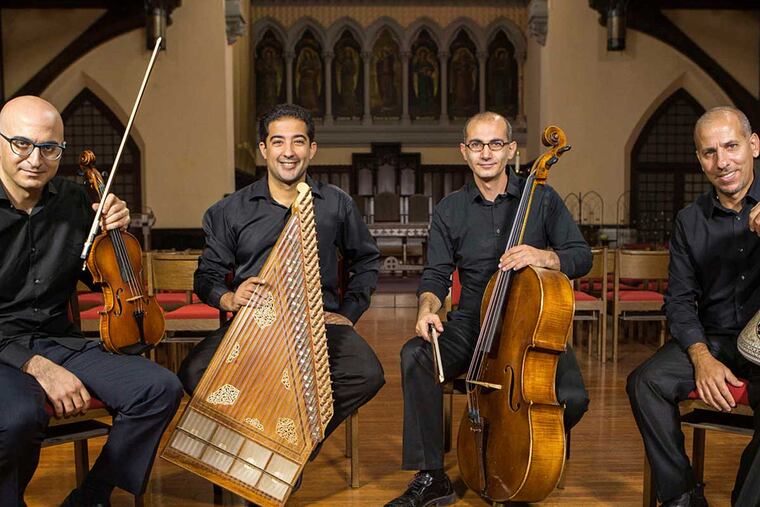Two pieces fuse Arab and Western music
The music isn't likely to sound like anything most Americans have heard: The polarities between Arab and Western music, both obvious and subtle, are such that their fusion in this Saturday's concert, Words Adorned: Andalusian Poetry and Music, at Bryn Mawr College might seem impossible. Then it becomes perfectly doable.

The music isn't likely to sound like anything most Americans have heard: The polarities between Arab and Western music, both obvious and subtle, are such that their fusion in this Saturday's concert, Words Adorned: Andalusian Poetry and Music, at Bryn Mawr College might seem impossible. Then it becomes perfectly doable.
"It's supposed to blend the sounds of this pluralistic, cosmopolitan city," said Hanna Khoury, music director of Al-Bustan Seeds of Culture Music Program, which instigated the year-in-the-planning concert with the Crossing choir in works by two Syrian-born composers. "I don't want to politicize the project - it never started as such . . . but it's more relevant than ever for works like this to happen, to diminish the divide that's out there."
"We're aware of that [the concert] has greater gravity now," said Donald Nally, director of the Crossing, referring to Syria's current civil war. "It's a gift . . . to make music with people from this part of the world - that's being raped and destroyed."
The concert includes two sizable new works by Kareem Roustom and Kinen Abou-afach, both based on Andalusian poems that are the conceptual core of the concert. In some ways, the composers are relieved to harken back to medieval times, when what is often called "Islamic Iberia" led the world in trigonometry, astronomy, and medicine.
"Either people are crying over the ruins of something that will never happen again," said Khoury, "or are evoking these great times with hopes that they will come back in the future. I chose to be among the latter."
Says Abou-afach, composer of Of Nights and Solace, "I just let the poems influence me. You can't be morbid when the poems are about love. And it's a different kind of love, such as love of God in a very innocent way."
One work employed by Roustom's Embroidered Verses: Songs on Andalusian Poetry, is dubbed "a war poem" - and it invites explanation. Though the words translated from 11th-century Arabic might seem opaque, they're not about aggression, but about defending ideals and galvanizing loyalty.
The commissions would seem to be a conscious East-West meeting of the minds, but they're more a matter of tapping what is already out there but perhaps hasn't been asked for. Works featured on Abou-afach's website gravitate toward one musical camp or the other, the Arab works sounding Arab, indeed, and the forays into American jazz sounding authentically American. That doesn't mean the middle ground represented by works on the Words Adorned concert were a stretch for them.
"This is who they are," said Khoury. "Kareem was born in Syria, grew up with a certain kind of music, and immersed himself in Western jazz and classical. So did Kinen," who has lived in the U.S. for 15 years. "It's very natural what they've done."
If there aren't more hybrids of this sort, it's because few organizations have asked for them - though the Al-Bustan Takht Ensemble blends instruments from both sides. Western harmony, though, can be tricky for Arab composers: Microtones are part of their language but can sound strange in choral harmonies to Western ears. And to traditional Arab ears, "if you add only one note extra to harmonize, it can feel unnatural," said Abou-afach. But that didn't stop him from writing a rather Western fugue into his piece.
Performers on both sides, though, have had to work hard in unprecedented ways. The popular Nazareth-born singer Dalal Abu Amneh, who is also featured in the concert, will be dealing with more frequently shifting pulses. Much Arab music follows the centuries-old practice of learning and transmitting from person to person rather than from a printed page, prompting a steady-rhythm foundation.
While learning Arabic pronunciation, the Crossing discovered that certain vowel sounds are difficult to keep in tune. Arab microtones - which give melodies a distinctively serpentine quality and energize the music with ornamental clots of notes - go against how Western musicians are taught to hear and sing. Yet they can't be avoided in any hybrid of the two cultures. To Nally's ears, that's part of the music's beauty and virtuosity: "I've been walking around all day playing with these modes . . . and I'm loving it."
Nally demonstrates by singing an Arab ornament with the authority of a native. "Even Arabic musicians can't immediately hit it on the head," said Abou-afach. Yet the composer deployed such ornaments with care: With a 24-voice choir, the results could be messy.
What ensures that the Saturday concert will show the music in a convincing light is the recording sessions that are part of the process: Unlike most such projects, this new music will be recorded on Al-Bustan's own label before the live performances. That suits Nally.
"The recording process is so meticulously detailed, and then you get to the performance," he said, "and you feel you can take any kind of risk you like."